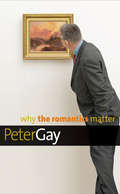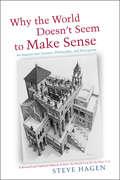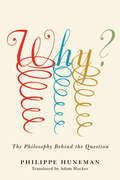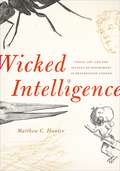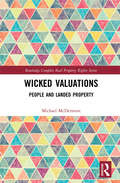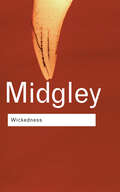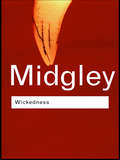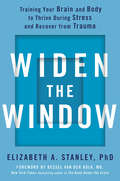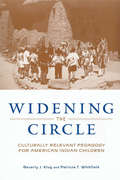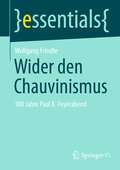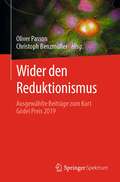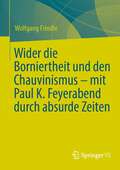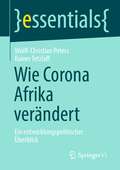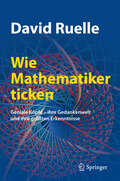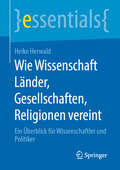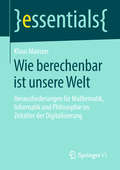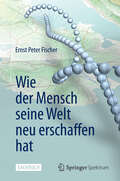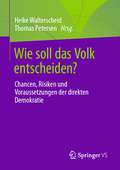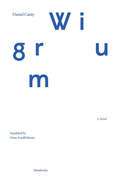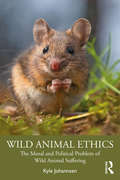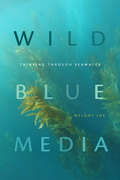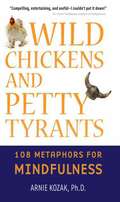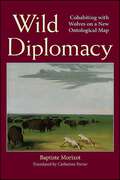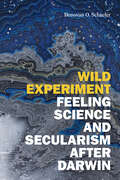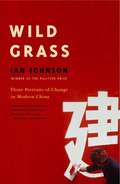- Table View
- List View
Why the Romantics Matter
by Peter GayWith his usual wit and élan, esteemed historian Peter Gay enters the contentious, long-standing debates over the romantic period. Here, in this concise and inviting volume, he reformulates the definition of romanticism and provides a fresh account of the immense achievements of romantic writers and artists in all media. Gay's scope is wide, his insights sharp. He takes on the recurring questions about how to interpret romantic figures and their works. Who qualifies to be a romantic? What ties together romantic figures who practice in different countries, employ different media, even live in different centuries? How is modernism indebted to romanticism, if at all? Guiding readers through the history of the romantic movement across Britain, France, Germany, and Switzerland, Gay argues that the best way to conceptualize romanticism is to accept its complicated nature and acknowledge that there is no "single basket" to contain it. Gay conceives of romantics in "families," whose individual members share fundamental values but retain unique qualities. He concludes by demonstrating that romanticism extends well into the twentieth century, where its deep and lasting impact may be measured in the work of writers such as T. S. Eliot and Virginia Woolf.
Why the World Doesn't Seem to Make Sense: An Inquiry into Science, Philosophy, and Perception
by Steve HagenThe bestselling author of Buddhism Plain and Simple ponders what we truly know about reality. Why the World Doesn&’t Seem to Make Sense is an eminently down-to-earth, practical, and non-technical response to the urgent questions posed by contemporary science and philosophy. This revised and updated edition of How the World Can Be the Way It Is includes new scientific understanding and clarification of some of its more complex ideas. Steve Hagen aims for an intelligent general audience not necessarily familiar with modern or classical physics, philosophy, or formal logic. Hagen takes us on a journey that examines our most basic assumptions about reality and carefully addresses the &“paradoxes of the one and the many&” that other works only identify. His primary purpose is to help us to perceive the world directly—as it is, not how we conceive it to be. Through this perception each of us can answer profound moral questions, resolve philosophical and ethical dilemmas, and live lives of harmony and joy. Praise for Why the World Doesn&’t Seem to Make Sense &“For those who are certain that objectivity and intellect are the ground floor of all knowledge, this can be a valuable tripe to the sub-basement.&” —Robert Pirsig, author of Zen and the Art of Motorcycle Maintenance &“An unusually stimulating and exhilarating book, of profound value to those seeking to clarify the essential nature of everyday existence—in short, all of us.&” —Peter Matthiessen, author of The Snow Leopard &“Read this book: it will change how you look at things.&” —Nick Herbert, PhD, author of Quantum Reality &“Hagen cuts cleanly through the duality of mind and body, perception and conception, science and religion, and takes us on a spell-binding journey through what we know—and what we only think we know—that ultimately provides a fresh, effective, and remarkably simple grounding for our lives. . . . Original, breathtaking, and beautiful.&” —Natalie Goldberg, author of Writing Down the Bones
Why?: The Philosophy Behind the Question (Square One: First-Order Questions in the Humanities)
by Philippe HunemanA philosopher explores the many dimensions of a beguilingly simple question. Why did triceratops have horns? Why did World War I occur? Why does Romeo love Juliet? And, most importantly, why ask why? Through an analysis of these questions and others, philosopher Philippe Huneman describes the different meanings of "why," and how those meanings can, and should (or should not), be conflated. As Huneman outlines, there are three basic meanings of why: the cause of an event, the reason of a belief, and the reason why I do what I do (the purpose). Each of these meanings, in turn, impacts how we approach knowledge in a wide array of disciplines: science, history, psychology, and metaphysics. Exhibiting a rare combination of conversational ease and intellectual rigor, Huneman teases out the hidden dimensions of questions as seemingly simple as "Why did Mickey Mouse open the refrigerator?," or as seemingly unanswerable as "Why am I me?" In doing so, he provides an extraordinary tour of canonical and contemporary philosophical thought, from Plato and Aristotle, through Descartes and Spinoza, to Elizabeth Anscombe and Ruth Millikan, and beyond. Of course, no proper reckoning with the question "why?" can afford not to acknowledge its limits, which are the limits, and the ends, of reason itself. Huneman thus concludes with a provocative elaboration of what Kant called the "natural need for metaphysics," the unallayed instinct we have to ask the question even when we know there can be no unequivocal answer.
Wicked Intelligence: Visual Art and the Science of Experiment in Restoration London
by Matthew C. HunterIn late seventeenth-century London, the most provocative images were produced not by artists, but by scientists. Magnified fly-eyes drawn with the aid of microscopes, apparitions cast on laboratory walls by projection machines, cut-paper figures revealing the OC exact proportionsOCO of sea monstersOCoall were created by members of the Royal Society of London, the leading institutional platform of the early Scientific Revolution. "Wicked Intelligence" reveals that these natural philosophers shaped Restoration LondonOCOs emergent artistic cultures by forging collaborations with court painters, penning art theory, and designing triumphs of baroque architecture such as St PaulOCOs Cathedral. aMatthew C. Hunter brings to life this archive of experimental-philosophical visualization and the deft cunning that was required to manage such difficult research. Offering an innovative approach to the scientific image-making of the time, he demonstrates how the Restoration project of synthesizing experimental images into scientific knowledge, as practiced by Royal Society leaders Robert Hooke and Christopher Wren, might be called OC wicked intelligence. OCO Hunter uses episodes involving specific visual practicesOCofor instance, concocting a lethal amalgam of wax, steel, and sulfuric acid to produce an active model of a cometOCoto explore how Hooke, Wren, and their colleagues devised representational modes that aided their experiments. Ultimately, Hunter argues, the craft and craftiness of experimental visual practice both promoted and menaced the artistic traditions on which they drew, turning the Royal Society projects into objects of suspicion in Enlightenment England. "a"The first book to use the physical evidence of Royal Society experiments to produce forensic evaluations of how scientific knowledge was generated, "Wicked Intelligence" rethinks the parameters of visual art, experimental philosophy, and architecture at the cusp of BritainOCOs imperial power and artistic efflorescence.
Wicked Valuations: People and Landed Property (Routledge Complex Real Property Rights Series)
by Michael McDermottTraditional valuation approaches are increasingly recognised as being insufficient to address the wicked valuation problems of the diverse peoples and groups that inhabit the globe from north, south, east to west. This book demonstrates the limitations of science and, in particular economics, as the foundation on which valuations are traditionally based. It demonstrates the importance of and provides justification for the personal, cultural values and norms which underpin our assessment of "value", and the fact that these vary across the world. In Wicked Valuations Michael McDermott develops a means of engaging with highly complex valuation problems. His autoethnography provides a lens to draw on knowledge and experience from his 40 years in land valuation in Africa and the Asia-Pacific, while documentary analysis is used to draw in the views of other valuation practitioners and scholars who are becoming increasingly aware of the need to develop ways to adapt land valuation processes to the complexity of our contemporary landscapes.
Wickedness (Routledge Classics)
by Mary Midgley Dr Mary MidgleyTo look into the darkness of the human soul is a frightening venture. Here Mary Midgley does so, with her customary brilliance and clarity. Midgley's analysis proves that the capacity for real wickedness is an inevitable part of human nature. This is not however a blanket acceptance of evil. Out of this dark journey she returns with an offering to us: an understanding of human nature that enhances our very humanity.
Wickedness: A Philosophical Essay (Routledge Classics)
by Mary Midgley Dr Mary MidgleyTo look into the darkness of the human soul is a frightening venture. Here Mary Midgley does so, with her customary brilliance and clarity. In Wickedness she sets out to delineate not so much the nature of wickedness as its actual sources. Midgley's analysis proves that the capacity for real wickedness is an inevitable part of human nature. This is not however a blanket acceptance of evil. She provides us with a framework that accepts its existence yet offers humankind the possibility of rejecting this part of our nature. Out of this dark journey she returns with an offering to us: an understanding of human nature that enhances our very humanity. To read Wickedness is to understand Mary Midgley's reputation as one of the world's greatest moral philosophers.
Widen the Window: Training Your Brain and Body to Thrive During Stress and Recover from Trauma
by Elizabeth A. Stanley"I don't think I've ever read a book that paints such a complex and accurate landscape of what it is like to live with the legacy of trauma as this book does, while offering a comprehensive approach to healing."--from the foreword by Bessel van der KolkA pioneering researcher gives us a new understanding of stress and trauma, as well as the tools to heal and thriveStress is our internal response to an experience that our brain perceives as threatening or challenging. Trauma is our response to an experience in which we feel powerless or lacking agency. Until now, researchers have treated these conditions as different, but they actually lie along a continuum. Dr. Elizabeth Stanley explains the significance of this continuum, how it affects our resilience in the face of challenge, and why an event that's stressful for one person can be traumatizing for another.This groundbreaking book examines the cultural norms that impede resilience in America, especially our collective tendency to disconnect stress from its potentially extreme consequences and override our need to recover. It explains the science of how to direct our attention to perform under stress and recover from trauma. With training, we can access agency, even in extreme-stress environments. In fact, any maladaptive behavior or response conditioned through stress or trauma can, with intentionality and understanding, be reconditioned and healed. The key is to use strategies that access not just the thinking brain but also the survival brain. By directing our attention in particular ways, we can widen the window within which our thinking brain and survival brain work together cooperatively. When we use awareness to regulate our biology this way, we can access our best, uniquely human qualities: our compassion, courage, curiosity, creativity, and connection with others. By building our resilience, we can train ourselves to make wise decisions and access choice--even during times of incredible stress, uncertainty, and change.With stories from men and women Dr. Stanley has trained in settings as varied as military bases, healthcare facilities, and Capitol Hill, as well as her own striking experiences with stress and trauma, she gives readers hands-on strategies they can use themselves, whether they want to perform under pressure or heal from traumatic experience, while at the same time pointing our understanding in a new direction.
Widening the Circle: Culturally Relevant Pedagogy for American Indian Children
by Beverly J. Klug Patricia T. WhitfieldRecognizing the need for a pedagogy that better serves American Indian students, Beverly J. Klug and Patricia T. Whitfield construct a pedagogical model that blends native and non-native worldviews and methods. Among the building blocks of this new, culturally relevant education are language-based approaches to literacy development, the use of oral histories to supplement traditional texts, and a re-evaluation of the knowledge base these students need for success in tribal enterprises.
Wider den Chauvinismus: 100 Jahre Paul K. Feyerabend (essentials)
by Wolfgang FrindteDieses Buch bietet zum Jubiläumsjahr eine kurze Biographie von Paul K. Feyerabend, eine Einführung in ausgewählte Schlüsselwerke und ein kritisches Fazit zu seiner Aktualität.
Wider den Reduktionismus: Ausgewählte Beiträge zum Kurt Gödel Preis 2019
by Oliver Passon Christoph BenzmüllerDie Autorinnen und Autoren präsentieren in diesem Buch Argumente, die die Unmöglichkeit des Reduktionismus aus philosophischer, naturwissenschaftlicher bzw. mathematisch-logischer Perspektive zu begründen suchen. Der Reduktionismus behauptet, dass Eigenschaften auch von komplexen Systemen (bis hin zu Lebensvorgängen und menschlichem Bewusstsein) vollständig auf ihre Bestandteile zurückgeführt werden können. Diese Position ist einflussreich, aber umstritten. Im Jahr 2019 hat der Kurt Gödel Freundeskreis einen Essaywettbewerb veranstaltet, um schlagende Argumente gegen den Reduktionismus zu finden. Unter den internationalen Teilnehmern waren neben weltweit führenden Forschern auch Wissenschaftler, die noch am Beginn ihrer Kariere stehen. Dieser Band versammelt die Beiträge der Preisträger und weitere ausgewählte Aufsätze. Aus dem Inhalt: · Kausalität als antireduktionistisches Hausmittel – Martin Breul · Reduktionismus im Diskurs – Hanna Hueske · Monads, Types, and Branching Time – Kurt Gödel’s approach towards a theory of the soul – Tim Lethen · The limits of reductionism: thought, life, and reality – Jesse M. Mulder · True or Rational? A Problem for a Mind-Body Reductionist – Michał Pawłowski · Why reductionism does not work – George F. R. Ellis · Physik ohne Reduktion – Rico Gutschmidt · Is there an Axiom for everything? – Jean-Yves Béziau · Unerklärliche Wahrheiten – Marco Hausmann · Gödel, mathematischer Realismus und Antireduktionismus – Reinhard Kahle
Wider die Borniertheit und den Chauvinismus – mit Paul K. Feyerabend durch absurde Zeiten
by Wolfgang FrindteAnlässlich seines 100. Geburtstages wird an Paul K. Feyerabend erinnert; es werden seine Ideen diskutiert und es wird gefragt, inwieweit diese geeignet sind, aktuelle Geschehnisse und Konflikte zu beurteilen.
Wie Corona Afrika verändert: Ein entwicklungspolitischer Überblick (essentials)
by Rainer Tetzlaff Wolff-Christian PetersDie wirtschaftlichen, sozialen und politischen Folgen der Corona-Pandemie werden in diesem essential analysiert. Drei Fallstudien (Äthiopien, Sambia und Südafrika) zeigen die Versäumnisse der Regierungspolitik. Zur Sprache kommen Fragen der Impfstoffbeschaffung und der Zukunft von Gesellschaften, die schon heute unter Hunger, Arbeitslosigkeit und der Perspektivlosigkeit einer verzweifelten Jugend leidet. Der Migrationsdruck wächst.
Wie Mathematiker ticken
by David RuelleDer renommierte mathematische Physiker David Ruelle schildert in dem Buch seine persönlichen Erfahrungen mit berühmten Mathematikern, deren Eigenarten und persönliche Tragödien - aber auch die erhabene Schönheit ihrer Entdeckungen. Jedes Kapitel stellt eine herausragende mathematische Idee und den visionären Verstand dahinter vor. Dabei gibt der Autor Einblick in die einzigartige Denkweise von Mathematikern und zeigt, weshalb er ihre Herangehensweise, um Fragen nach Sinn, Schönheit und Natur der Wirklichkeit zu diskutieren, für die beste hält.
Wie Wissenschaft Länder, Gesellschaften, Religionen vereint: Ein Überblick für Wissenschaftler und Politiker (essentials)
by Heiko HerwaldUnsere heutige Welt ist geprägt von einer rasanten technologischen Entwicklung. Die daraus resultierende digitale Reizüberflutung, das unermessliche Sammeln von Daten und die Entwicklung von Algorithmen, die für uns jetzt schon Entscheidungen übernehmen, haben das Wertesystem der Menschen verändert. Anhand des Höhlengleichnisses von Platon beschreibt der Autor, wieso der Mensch seine Unabhängigkeit aufgibt und er sich von einem Homo sapiens zu einem Homo accumulans (speichernder Mensch) entwickelt hat. Er zeigt auf, warum Paradigmenwechsel in Religion, Politik und Wissenschaft für die Weiterentwicklung der Menschheit von großer Bedeutung waren und wieso dies für die Wissenschaft auch weiterhin notwendig sein wird, um Lösungen für globale Probleme zu entwickeln.
Wie berechenbar ist unsere Welt: Herausforderungen Für Mathematik, Informatik Und Philosophie Im Zeitalter Der Digitalisierung (Essentials)
by Klaus MainzerKlaus Mainzer legt in diesem essential dar, dass die Zukunft von KI und Digitalisierung eine nüchterne Analyse erfordert, die Grundlagenforschung mit Anwendung verbindet. Berechenbarkeits- und Beweistheorie können dazu beitragen, Big Data und Machine Learning sicherer zu bewältigen. Dabei zeigt sich, dass die komplexen Herausforderungen der digitalen und analogen Welt in Grundlagenfragen der Mathematik, Informatik und Philosophie tief verwurzelt sind.
Wie der Mensch seine Welt neu erschaffen hat
by Ernst Peter Fischer"Wissenschaft wird von Menschen gemacht" Mit diesem Zitat des Physikers und Humanisten Werner Heisenberg leitet Ernst Peter Fischer sein Buch über die "zweite Erschaffung der Welt" ein. Seiner Auffassung nach nehmen wir diesen einfachen und an sich selbstverständlichen Satz nicht zur Kenntnis und ernst, wie die Naturforscher mit ihren naturwissenschaftlichen und medizinischen Erträgen seit dem 17. Jahrhundert maßgeblich ihr und damit unser aller gegenwärtiges Leben geprägt und praktisch gestaltet haben. Er schreibt: "Tatsächlich ist es so, dass sich europäische Gesellschaften - nicht zuletzt die deutsche - im frühen 21. Jahrhundert nahezu vollständig und unumkehrbar in Abhängigkeit von wissenschaftlich-technischen Fortschritten etwa bei der Ressourcennutzung, der Energiegewinnung, der Krankenversorgung oder der Kommunikation entfaltet haben. Und ihre Geschichte - ihr Vorwärtsstreben in die derzeitige Lage und ihr Aussehen - kann man nur verstehen, wenn man die dazugehörige Dynamik berücksichtigt, wenn man also die Geschichte der Wissenschaften und der mit ihren Kenntnissen möglichen Technik zur Kenntnis nimmt, die in ihrer relevanten und aktuellen Form im frühen 17. Jahrhundert begonnen und den europäischen Sonderweg zum Wohlstand bereitet hat, den viele Millionen Menschen ganz selbstverständlich in wachsender Zahl genießen, ohne zu fragen, woher er kommt und welchen Ideen sie ihn zu verdanken haben."
Wie soll das Volk entscheiden?: Chancen, Risiken und Voraussetzungen der direkten Demokratie
by Thomas Petersen Heike WalterscheidDieses Buch beleuchtet aus interdisziplinärer und ländervergleichender Perspektive, unter welchen Bedingungen direkte Demokratie funktionieren kann, wo ihre Chancen und Risiken liegen und welche Rolle dabei die politische Bildung, die politische Kulturtradition eines Landes, der Zusammenhang von Entscheidung und Verantwortung und der Grad der Kleinräumigkeit und Dezentralität der Entscheidungsstrukturen spielt. Ausdrücklich wird weder für noch gegen die direkte Demokratie plädiert, sondern das Thema unvoreingenommen und mit der Gründlichkeit behandelt, die die öffentliche Diskussion über plebiszitäre Elemente in der Politik meistens vermissen lässt.
Wigrum
by Daniel Canty Oana AvasilichioaeiEnd of October 1944. Sebastian Wigrum absconds from his London flat. Very little is known about him, except his intense curiosity about the world and perhaps his disillusionment in love. The legacy of this man, who lived to collect has left in his wake an inventory of some hundred objects, which shed light on the history of our time.
Wild Animal Ethics: The Moral and Political Problem of Wild Animal Suffering
by Kyle JohannsenThough many ethicists have the intuition that we should leave nature alone, Kyle Johannsen argues that we have a duty to research safe ways of providing large-scale assistance to wild animals. Using concepts from moral and political philosophy to analyze the issue of wild animal suffering (WAS), Johannsen explores how a collective, institutional obligation to assist wild animals should be understood. He claims that with enough research, genetic editing may one day give us the power to safely intervene without perpetually interfering with wild animals’ liberties. Questions addressed include: In what way is nature valuable and is intervention compatible with that value? Is intervention a requirement of justice? What are the implications of WAS for animal rights advocacy? What types of intervention are promising? Expertly moving the debate about human relations with wild animals beyond its traditional confines, Wild Animal Ethics is essential reading for students and scholars of political philosophy and political theory studying animal ethics, environmental ethics, and environmental philosophy.
Wild Blue Media: Thinking through Seawater (Elements)
by Melody JueIn Wild Blue Media, Melody Jue destabilizes terrestrial-based ways of knowing and reorients our perception of the world by considering the ocean itself as a media environment—a place where the weight and opacity of seawater transforms how information is created, stored, transmitted, and perceived. By recentering media theory on and under the sea, Jue calls attention to the differences between perceptual environments and how we think within and through them as embodied observers. In doing so, she provides media studies with alternatives to familiar theoretical frameworks, thereby challenging scholars to navigate unfamiliar oceanic conditions of orientation, materiality, and saturation. Jue not only examines media about the ocean—science fiction narratives, documentary films, ocean data visualizations, animal communication methods, and underwater art—but reexamines media through the ocean, submerging media theory underwater to estrange it from terrestrial habits of perception while reframing our understanding of mediation, objectivity, and metaphor.
Wild Chickens and Petty Tyrants
by Arnie KozakThis engaging and accessible little book is filled with both humor and profound teaching. It presents 108 metaphors for mindfulness, meditation practice, the nature of the self, change, deep acceptance, and other related concepts that Dr. Kozak has cultivated over twenty-five years of meditating, practicing yoga, and working as a clinical psychologist. Metaphors are indispensable to understanding mindfulness, and to help deeply internalize it and make it a part of everyday life. These mentally catchy images can motivate us to practice, show us how and where to bring mindfulness to life in our personal experience, and help us employ powerful methods for transformation.
Wild Diplomacy: Cohabiting with Wolves on a New Ontological Map
by MorizotStarting from a specific case, the spontaneous return of wolves to France and the intense conflicts that event has triggered, the French philosopher Baptiste Morizot invites us to think about what he calls "diplomacy with living beings." How can we conceive of cohabitation with the most recalcitrant wildlife, large predators in particular, and what concrete solutions need to be invented to make this happen? Drawing on knowledge gleaned from history and philosophy as well as from ethology, scientific ecology, and biology, Wild Diplomacy prompts us to ask what relations we want to reinvent with living beings today and how we might fundamentally reimagine our status as living beings among other life forms. This prize-winning book has broken new ground in contemporary French environmental philosophy.
Wild Experiment: Feeling Science and Secularism after Darwin
by Donovan O. SchaeferIn Wild Experiment, Donovan O. Schaefer challenges the conventional wisdom that feeling and thinking are separate. Drawing on science studies, philosophy, affect theory, secularism studies, psychology, and contemporary literary criticism, Schaefer reconceptualizes rationality as defined by affective processes at every level. He introduces the model of “cogency theory” to reconsider the relationship between evolutionary biology and secularism, examining mid-nineteenth-century Darwinian controversies, the 1925 Scopes Trial, and the New Atheist movement of the 2000s. Along the way, Schaefer reappraises a range of related issues, from secular architecture at Oxford to American eugenics to contemporary climate denialism. These case studies locate the intersection of thinking and feeling in the way scientific rationality balances excited discovery with anxious scrutiny, in the fascination of conspiracy theories, and in how racist feelings assume the mantle of rational objectivity. The fact that cognition is felt, Schaefer demonstrates, is both why science succeeds and why it fails. He concludes that science, secularism, atheism, and reason itself are not separate from feeling but comprehensively defined by it.
Wild Grass: Three Stories of Change in Modern China
by Ian JohnsonIn Wild Grass, Pulitzer Prize-winning journalist Ian Johnson tells the stories of three ordinary Chinese citizens moved to extraordinary acts of courage: a peasant legal clerk who filed a class-action suit on behalf of overtaxed farmers, a young architect who defended the rights of dispossessed homeowners, and a bereaved woman who tried to find out why her elderly mother had been beaten to death in police custody. Representing the first cracks in the otherwise seamless façade of Communist Party control, these small acts of resistance demonstrate the unconquerable power of the human conscience and prophesy an increasingly open political future for China.
